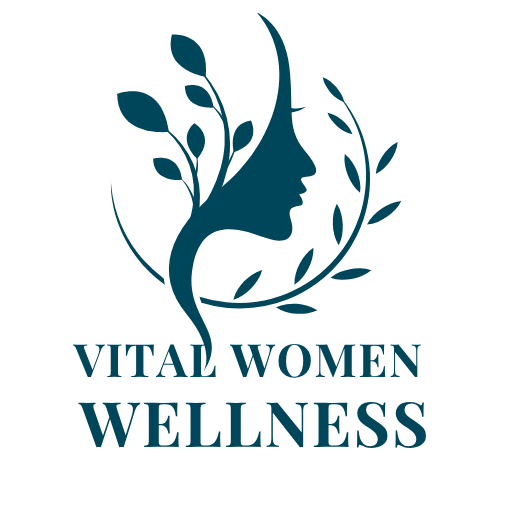Menopause marks a significant transition in a woman’s life, bringing both physical and emotional changes. As estrogen levels decline, the body becomes more vulnerable to oxidative stress, which can exacerbate many menopausal symptoms.
Antioxidants play a crucial role in managing this oxidative stress and supporting overall health during this transformative phase.
The Menopause-Oxidative Stress Connection
During menopause, the body undergoes a dramatic shift in hormone levels, particularly a decline in estrogen. This hormonal change affects the entire body, including our cells’ ability to manage oxidative stress.
Oxidative stress occurs when there’s an imbalance between free radicals (unstable molecules that can damage cells) and antioxidants (compounds that neutralize free radicals).
Estrogen itself has antioxidant properties, helping to protect our cells from damage. As estrogen levels drop, our bodies become more vulnerable to oxidative stress, which can worsen many of the symptoms associated with menopause.
Antioxidants: Your Menopausal Allies
Antioxidants act as the body’s cleanup crew, neutralizing harmful free radicals before they can damage our cells. They come in many forms, including vitamins (C and E), minerals (selenium), and plant compounds (flavonoids and polyphenols).
During menopause, antioxidants can play a crucial role in managing various symptoms and protecting long-term health. They help combat inflammation, support cardiovascular health, maintain cognitive function, and even slow down the visible signs of aging.
At a molecular level, antioxidants donate electrons to unstable free radicals, effectively neutralizing them. This prevents the free radicals from causing oxidative damage to our cells, DNA, and proteins.
Key Antioxidants for Menopausal Support
Let’s explore some specific antioxidants that can be particularly useful during menopause:
1. Vitamin C
Vitamin C supports collagen production, which is essential for skin elasticity and bone health – both of which can be affected by menopause. It also enhances iron absorption, which can be useful for women experiencing heavy menstrual bleeding during perimenopause.
Vitamin C is found abundantly in citrus fruits, berries, kiwi, and bell peppers. It’s also available in supplement form, but it’s generally best to obtain it from dietary sources when possible.
Recommended Product :
NutriFlair Liposomal Vitamin C – Each serving delivers 1700mg of premium vitamin C, encapsulated in liposomes for efficient absorption and nutrient delivery. Liposomal encapsulation helps support better nutrient availability compared to traditional vitamin C supplements. A smart addition to your daily routine to help maintain balanced nutrition and everyday vitality.
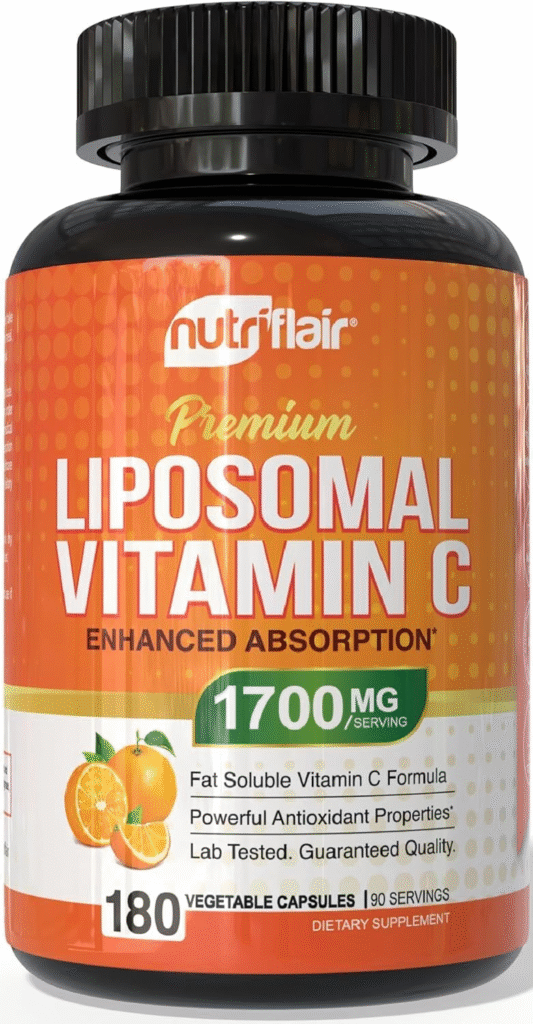
2. Vitamin E
Known for its ability to protect cell membranes, vitamin E may help reduce hot flashes and support heart health. Some studies suggest that vitamin E can help reduce vaginal dryness, a common menopausal symptom.
Good sources of vitamin E include nuts, seeds, avocados, and vegetable oils. If considering supplements, it’s important to talk to a healthcare provider, as high doses of vitamin E can interfere with blood clotting.
Recommended Product :
NATURELO Vitamin E – Formulated to provide the natural form of Vitamin E from vegetable sources and sunflower plus a blend of whole foods that typically contain naturally-occurring vitamin E including coconut oil, rice bran, avocado oil, mango and kiwi. Natural vitamin E is up to 3 times better absorbed than the synthetic version.
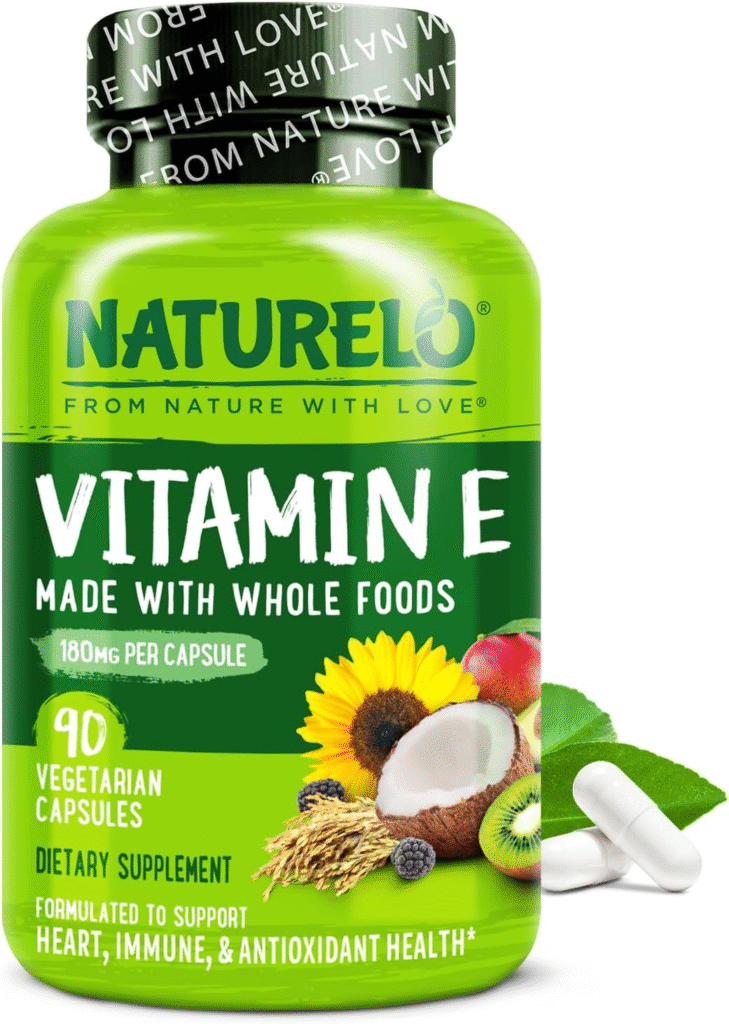
3. Selenium
This mineral is crucial for thyroid function and may help manage mood swings associated with menopause. Selenium also supports the immune system, which can become compromised during the menopausal transition.
Brazil nuts are an excellent source of selenium – just one or two nuts can provide the daily recommended amount. Other sources include fish, meat, and whole grains.
Recommended Product:
Clean Nutra Selenium – This product takes selenium and zinc supplements and combines them with potassium iodine, l-tyrosine supplement, and ashwagandha capsules and the results are amazing. Normal thyroid vitamins and supplements contain selenium 200mcg. However, Clean Nutra has officially created an even more potent all in one thyroid supplement.
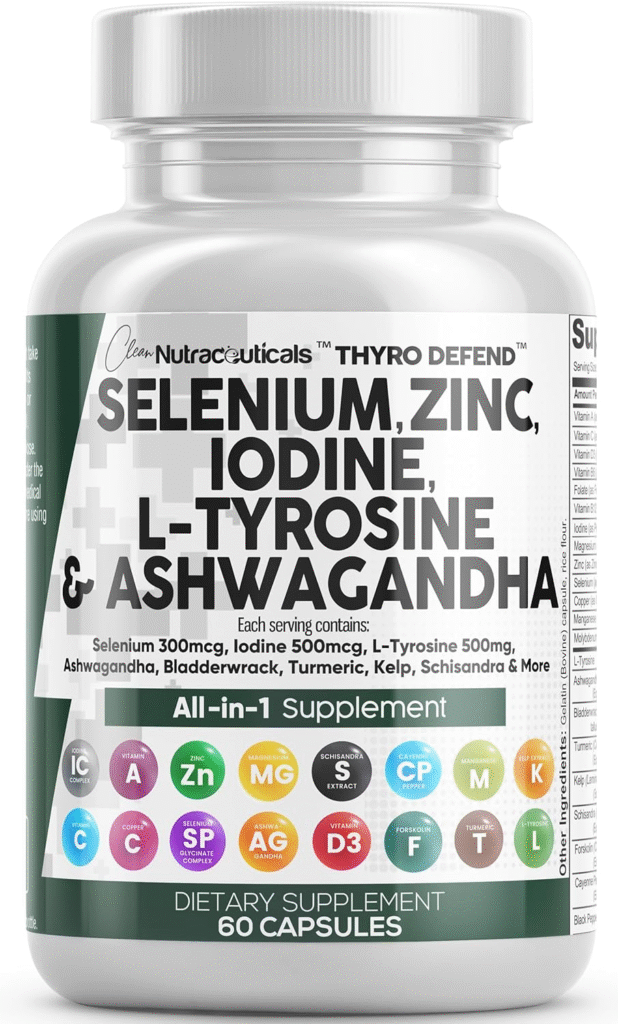
4. Flavonoids
Found in colorful fruits and vegetables, flavonoids can help reduce inflammation and support cardiovascular health. Certain flavonoids, like isoflavones found in soy, have weak estrogenic effects that may help reduce some menopausal symptoms.
Berries, citrus fruits, onions, and dark chocolate are all rich in flavonoids. Soy products like tofu and tempeh are good sources of isoflavones.
Recommended Product:
Citrus Bioflavonoids – This product contains only real plant extracts: 840mg bitter orange extract (Citrus aurantium extract) and 20mg grapefruit extract (Citrus paradisi extract) free from additives, vegan, gluten and lactose free.
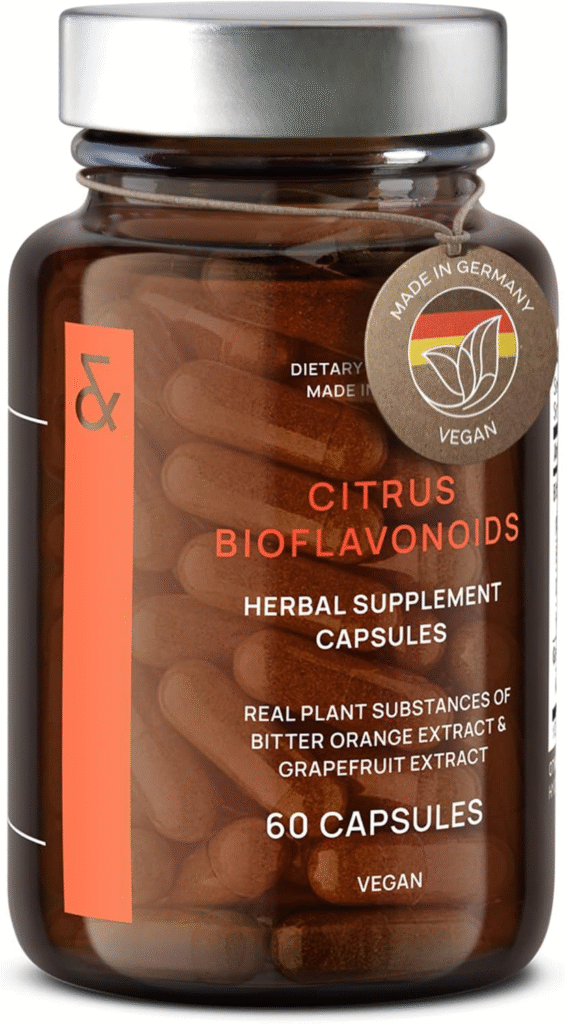
5. Resveratrol
This compound, found in red wine and berries, has shown potential benefits for bone health and cognitive function. Some research suggests that resveratrol may help counteract the bone loss associated with estrogen deficiency.
While red wine contains resveratrol, it’s not recommended to start drinking alcohol for this benefit. Instead, focus on other sources like grapes, blueberries, and peanuts.
Recommended Product:
Nanoceutical Solutions Nano Liquid Resveratrol – This trans resveratrol supplement from Nanoceutical Solutions is made with a proprietary nano-technology manufacturing process that reduces particle size to less than a micron for an exceptionally bioavailable source of this potent polyphenol.

6. Coenzyme Q10 (CoQ10)
This antioxidant plays a crucial role in energy production within our cells. CoQ10 levels naturally decline with age, and supplementation may help boost energy levels and support heart health during menopause.
CoQ10 is found in small amounts in organ meats, fatty fish, and whole grains. However, it’s difficult to get therapeutic amounts from diet alone, so supplements may be useful for some women.
Recommended Product:
Life Extension Super Ubiquinol CoQ10 with Enhanced Mitochondrial Support – This formula delivers 200 mg of ubiquinol CoQ10, which is superior to ubiquinone varieties at promoting healthy levels of CoQ10 in your blood. It is augmented with shilajit to complement these benefits.
The cells in your body’s hardest-working organs have high energy requirements and are vulnerable to oxidative stress. CoQ10’s antioxidant properties help encourage heart health and liver function.
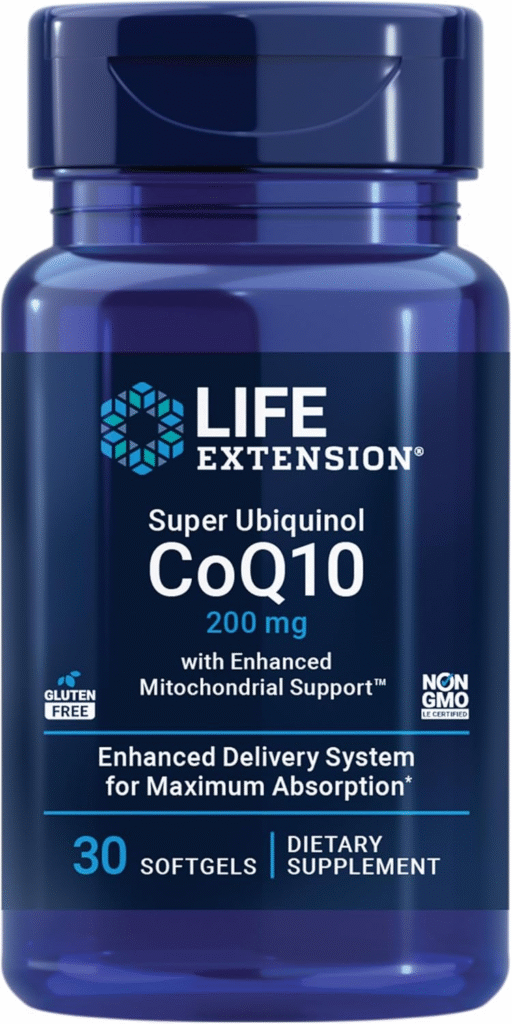
7. Lycopene
Found in tomatoes and other red fruits, lycopene is a powerful antioxidant that may Found in tomatoes and other red fruits, lycopene is a powerful antioxidant that may help protect against breast cancer, a concern for many menopausal women.
Cooked tomato products, like tomato sauce and paste, are excellent sources of lycopene. Other sources include watermelon, pink grapefruit, and papaya.
Recommended Product:
Ganoherb Reishi Lycopene – This Lycopene supplement was sourced from natural tomato fruits, providing essential support for overall wellness and physical balance. This Lycopene capsules are manufactured in sterile labs under strict GMP standards and are free fillers or other artificial ingredients.
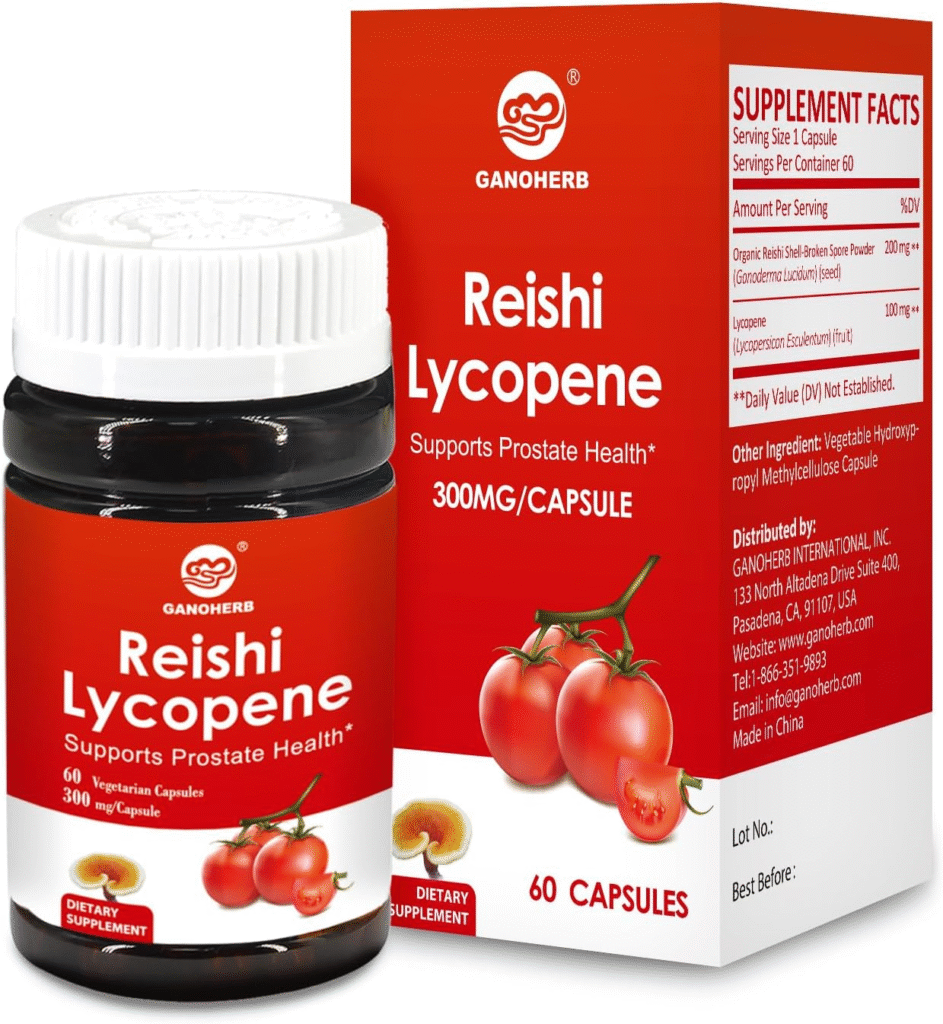
Dietary Sources of Antioxidants
While supplements can be helpful, the best way to get antioxidants is through a varied, colorful diet. Here’s a more in-depth look at some antioxidant-rich foods to include in your menopausal meal plan:
1. Berries
Blueberries, strawberries, and raspberries are packed with flavonoids and vitamin C. They’re also low in calories and high in fiber, making them an excellent choice for weight management during menopause.
Try adding a handful of mixed berries to your morning yogurt or oatmeal, or enjoy them as a refreshing snack.
2. Dark Leafy Greens
Spinach, kale, and collard greens are rich in vitamins C and E, as well as other antioxidants. They’re also excellent sources of calcium, which is crucial for bone health post-menopause. Incorporate these greens into salads, smoothies, or sautéed as a side dish. You can also add them to soups and stews for an extra nutrient boost.
3. Nuts and Seeds
Walnuts, almonds, and flaxseeds are high in vitamin E and healthy fats. They can help balance hormones and reduce inflammation. A small handful of mixed nuts makes for a satisfying snack. You can also sprinkle ground flaxseed on your cereal or yogurt for added benefits.
4. Colorful Vegetables
Bell peppers, sweet potatoes, and tomatoes provide a variety of antioxidants, including vitamin C, beta-carotene, and lycopene. Roast a mix of colorful vegetables as a side dish, or use them in stir-fries and salads for a nutrient-packed meal.
5. Green Tea
Rich in catechins, a type of flavonoid, green tea may help boost metabolism and support weight management during menopause. Try swapping one of your daily coffee cups for green tea. You can enjoy it hot or iced, depending on your preference.
6. Dark Chocolate
In moderation, dark chocolate (70% cocoa or higher) can be a delicious source of flavonoids. It may also help improve mood and reduce stress. Enjoy a small square of dark chocolate as an after-dinner treat. Moderation is key to reap the benefits without overindulging.
7. Citrus Fruits
Oranges, grapefruits, and lemons are excellent sources of vitamin C and flavonoids. Start your day with a glass of freshly squeezed orange juice, or add lemon slices to your water for a refreshing drink.
8. Cruciferous Vegetables
Broccoli, cauliflower, and Brussels sprouts contain compounds that may help balance hormones and protect against certain cancers. Steam or roast these vegetables to preserve their nutrient content. They make excellent side dishes or additions to salads and stir-fries.
9. Garlic and Onions
These allium vegetables contain sulfur compounds that act as antioxidants and may help reduce inflammation.
Use garlic and onions as a base for soups, stews, and sauces to add flavor and boost the antioxidant content of your meals.
10. Beans and Lentils
High in antioxidants and fiber, these legumes can help stabilize blood sugar levels and support heart health. Incorporate beans and lentils into soups, salads, or as a meat substitute in tacos or burgers.
Variety is key when it comes to antioxidants. Different antioxidants work in different ways, so aim for a rainbow of fruits and vegetables on your plate.
The more colorful your diet, the more diverse your antioxidant intake will be.
Antioxidants and Menopausal Symptoms
Now, let’s explore how antioxidants can help manage specific menopausal symptoms:
1. Hot Flashes and Night Sweats
Some studies suggest that antioxidants, particularly vitamin E, may help reduce the frequency and intensity of hot flashes. The exact mechanism isn’t fully understood, but it may be related to the antioxidants’ ability to support blood vessel function and hormone balance.
To potentially reduce hot flashes, try incorporating more vitamin E-rich foods into your diet, such as almonds, sunflower seeds, and avocados.
2. Mood Swings
Antioxidants like selenium and omega-3 fatty acids may help stabilize mood and reduce irritability. These compounds support brain health and can help regulate neurotransmitters involved in mood regulation.
Include selenium-rich foods like Brazil nuts and fatty fish in your diet. You might also consider talking to your healthcare provider about omega-3 supplements if you don’t regularly consume fish.
3. Skin Aging
Vitamins C and E, along with other antioxidants, can help protect skin from free radical damage and support collagen production. This can help maintain skin elasticity and reduce the appearance of fine lines and wrinkles.
In addition to consuming antioxidant-rich foods, consider using skincare products containing vitamins C and E. Remember to always wear sunscreen to protect your skin from UV damage.
4. Bone Health
Antioxidants like vitamin C and flavonoids can support bone density, which is crucial as the risk of osteoporosis increases after menopause. These compounds help protect bone-forming cells from oxidative stress and support collagen production in bone tissue.
In addition to antioxidant-rich foods, ensure you’re getting enough calcium and vitamin D, which are essential for bone health. Weight-bearing exercises can also help maintain bone density.
5. Cognitive Function
Antioxidants, especially flavonoids and omega-3s, may help maintain cognitive function and reduce the risk of age-related cognitive decline. They protect brain cells from oxidative damage and support healthy blood flow to the brain.
Include plenty of berries, leafy greens, and fatty fish in your diet to support brain health. Engaging in regular mental exercises, like puzzles or learning a new skill, can also help maintain cognitive function.
6. Weight Management
Some antioxidants, like the catechins in green tea, may help boost metabolism and support weight management. This can be particularly useful during menopause when many women experience weight gain.
In addition to incorporating green tea into your diet, focus on a balanced eating plan and regular physical activity for effective weight management.
7. Heart Health
Antioxidants play a crucial role in protecting the heart and blood vessels from oxidative damage. This is especially important during menopause when the risk of cardiovascular disease increases because of declining estrogen levels.
Include a variety of antioxidant-rich foods in your diet, particularly those high in flavonoids like berries and dark chocolate. Regular cardiovascular exercise is also essential for heart health.
8. Vaginal Health
While more research is needed, some antioxidants, particularly vitamin E, may help reduce vaginal dryness and discomfort. Vitamin E can be applied topically or consumed through diet or supplements.
If you’re experiencing vaginal discomfort, talk to your healthcare provider about potential treatments, including antioxidant-based options.
Frequently Asked Questions
What are the best antioxidants for menopause?
Vitamin C, vitamin E, selenium, and flavonoids are among the most useful antioxidants for menopausal women. These can help manage symptoms and support overall health during this transition.
Can antioxidants help with hot flashes?
Some studies suggest that certain antioxidants, particularly vitamin E, may help reduce the frequency and intensity of hot flashes. However, more research is needed to fully understand this relationship.
Are there specific foods that are high in antioxidants for menopause?
Berries, dark leafy greens, nuts, and colorful vegetables are all excellent sources of antioxidants that can be useful during menopause.
How do antioxidants help with skin aging during menopause?
Antioxidants like vitamins C and E can help protect skin from free radical damage and support collagen production, potentially reducing the appearance of fine lines and wrinkles.
Can antioxidants improve mood during menopause?
Some antioxidants, like selenium and omega-3 fatty acids, may help stabilize mood and reduce irritability associated with menopause.
Is it better to get antioxidants from food or supplements?
While it’s generally best to obtain antioxidants from a varied diet, supplements can be useful in some cases. Always talk to a healthcare provider before starting any new supplement regimen.
How much green tea should I drink for antioxidant benefits during menopause?
While there’s no set amount, drinking 2-3 cups of green tea daily can provide useful antioxidants that may help with weight management and overall health during menopause.
Can antioxidants help with weight gain during menopause?
Some antioxidants, like the catechins in green tea, may help boost metabolism. However, a balanced diet and regular exercise are key for managing weight during menopause.
Are there any risks associated with taking antioxidant supplements during menopause?
High doses of certain antioxidant supplements can have adverse effects. It’s important to discuss supplement use with a healthcare provider, especially if you have any existing health conditions.
How long does it take to see benefits from increasing antioxidant intake?
The timeline can vary depending on the person and the specific antioxidants. Some people may notice improvements in a few weeks, while for others it may take several months of consistent intake.
Key Takeaways:
- Antioxidants play a crucial role in managing oxidative stress during menopause
- A varied, colorful diet is the best source of antioxidants
- Specific antioxidants can help with different menopausal symptoms
- Lifestyle factors like exercise and stress management also support antioxidant function
- Balance is key when it comes to antioxidants, especially those with hormone-like effects
Disclaimer
The information contained in this post is for general information purposes only. The information is provided by Antioxidants and Menopause: What You Need to Know and while we endeavor to keep the information up to date and correct, we make no representations or warranties of any kind, express or implied, about the completeness, accuracy, reliability, suitability or availability with respect to the website or the information, products, services, or related graphics contained on the post for any purpose.
